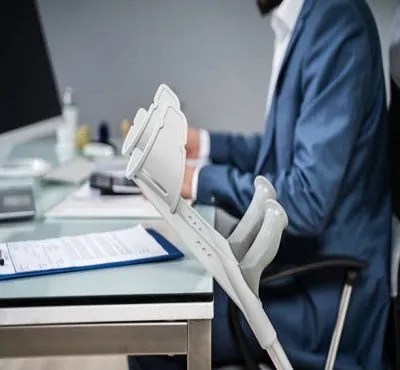We do not request reimbursement of costs
(such as repayment for obtaining medical records)
from veterans nor from people who suffer from multiple sclerosis.
- Call today for a free evaluation
- 1-888-774-7243
Disability Benefits For Pseudobulbar Affect
In the United States, around 1 million citizens suffer from a condition known as pseudobulbar affect or emotional lability. It mainly impacts people with multiple sclerosis, head injuries, brain tumors, dementia or amyotrophic lateral sclerosis. Stroke victims can also develop pseudobulbar affect. This neurological disorder often prevents people from working and performing other basic daily tasks. Fortunately, Social Security disability insurance can provide assistance.
What is Pseudobulbar Affect?
 This condition makes an individual laugh or weep uncontrollably for several minutes at a time. These outbursts can happen when people don’t actually feel the corresponding emotions. They also occur in slightly sorrowful or funny circumstances that don’t normally merit strong reactions. Some individuals become frustrated and experience angry outbursts as well.
This condition makes an individual laugh or weep uncontrollably for several minutes at a time. These outbursts can happen when people don’t actually feel the corresponding emotions. They also occur in slightly sorrowful or funny circumstances that don’t normally merit strong reactions. Some individuals become frustrated and experience angry outbursts as well.
These symptoms may appear at any moment, but some situations increase the risk. They range from phone conversations to highly stimulating environments and public speaking. Most individuals behave normally after the outbursts end. However, the disorder embarrasses people and may cause them to become socially isolated. This commonly results in more problems, such as anxiety or depression.
Doctors usually diagnose pseudobulbar affect by discussing the symptoms and asking a variety of questions. A physician will need to know how long the average outburst persists, how frequently the episodes happen and what emotions they trigger. Some doctors ask patients to undergo electroencephalogram tests. The testing equipment monitors brain waves without causing any discomfort. It helps medical professionals confirm that people suffer from pseudobulbar affect rather than epilepsy.
Getting SSDI for Pseudobulbar Affect
Prescription drugs do little to prevent these outbursts of crying and laughter. Many individuals need financial assistance to survive while they cope with this disruptive condition. Social Security disability insurance will grant benefits if an applicant proves that he or she cannot stay employed. The government only does this when the symptoms prevent a person from performing an existing job and make it extremely difficult to find a suitable occupation.
Rather than treating all pseudobulbar affect claimants the same way, officials at the Social Security Administration evaluate each person separately. They determine if the condition degrades important mental or physical abilities that people need to carry out occupational tasks. The government will only assess an individual’s physical state when a separate non-mental disability also exists.
Social Security officials need evidence of cognitive problems that undermine job performance. For instance, they will try to find out if the condition distracts co-workers and limits productivity. It’s also vital to ascertain if a person has difficulty maintaining positive relationships with customers or fellow employees. Furthermore, officials must evaluate the SSDI claimant’s capability to perform a job reliably.
Other important factors involve memory, hygiene, stress and listening. Pseudobulbar affect primarily harms a person’s ability to communicate normally. This neurological affliction also disrupts work activities and limits an individual’s capacity to cope with stressful situations. The SSA may or may not approve a claim depending on the severity of the disorder and any accompanying medical conditions.
Pseudobulbar affect isn’t an easy problem to diagnose and verify, such as paralysis or missing limbs. This makes it comparatively hard to obtain help from the government. Nevertheless, it’s quite possible to accomplish this with assistance from a knowledgeable Disability Lawyers in Philadelphia know how to gather evidence, present it in a compelling way and appeal any unfavorable decisions.
For a Free Evaluation
Monday : 9am–5pm
Tuesday : 9am–5pm
Wednesday : 9am–5pm
Thursday : 9am–5pm
Friday : 9am–5pm
Saturday : Closed
Sunday :Closed

